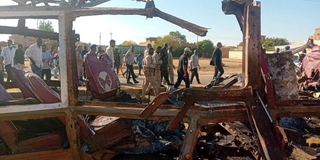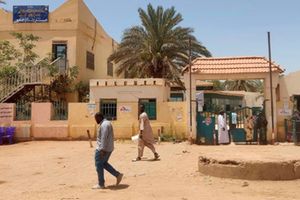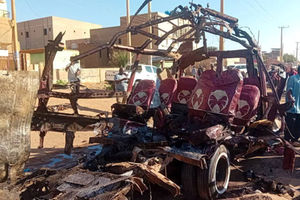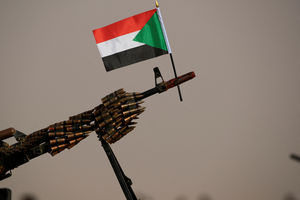
People gather near a destroyed vehicle, following shelling by the Rapid Support Forces, in Omdurman, Sudan, December 10, 2024.
Sudan's warring factions are defying the latest push by civilian movements to tame the escalating violence with a proposal for a political solution.
Sporadic fighting erupted a week after the movements made another attempt to resolve the country's deadly conflict. This conflict, in which the Sudanese Armed Forces and the Rapid Support Forces have been involved, has already defied five previous peace bids from various international parties.
And the violence, south of the capital Khartoum, came as new data showed that the humanitarian situation had worsened, with more than half of Khartoum's hospitals now inoperable following a series of bombings.
A study published by a team of doctors from the Sudanese American Physicians Association and researchers from the Yale Public School of Health said 41 hospitals had been bombed and at least 25 medical training schools destroyed.
The renewed violence by RSF came after weeks of recruitment of civilians by both sides. It also came after international investigators warned that the RSF had received a new batch of weapons from outside backers.
It means the push by the leadership of the civilian movements, known as the Coordination of Democratic and Civil Forces (Taqqadum) and chaired by former prime minister Abdalla Hamdok, would face a new challenge.
The group argued last week that Sudan's problems were political, not military.
Their discussions in Entebbe, Uganda last week lasted four days and came 20 months after the war began on April 15, 2023.
Taqqadum’s version of a comprehensive political process, they argue, will ensure sustainable peace and rebuild the Sudanese state. Their strategy includes:
- Building a broad civil front: Taqqadum aims to unite all pro-democracy forces to end the war and achieve the goals of the December Revolution.
- Political dialogue for sustainable peace: Taqqadum calls on the warring parties to cease hostilities and prioritise humanitarian aid, and emphasises that a peaceful solution must involve various stakeholders, including civil society and resistance committees, while excluding and holding accountable those from the former regime.
- Restoring the revolution's legitimacy: The meeting condemned the SAF's attempts to claim legitimacy, describing them as unconstitutional and divisive. Taqqadum vowed to challenge any form of false legitimacy and defend Sudan's unity and the ideals of the December Revolution.
Taqqadum had previously tried to find a third path away from the warring parties -- the Sudan Armed Forces and the paramilitary group Rapid Support Forces. They include groups that ousted Omar al-Bashir in 2019 through street protests. They also include non-warring politicians, activists, clerics and some groups that have taken up arms in the past but haven't yet taken sides in this war.
Their statement highlighted the devastating impact of the war, which has led to tens of thousands of civilian casualties, the displacement of more than 12 million people and the world's biggest food security disaster, threatening 25 million lives, UN agencies warned last week.
It also noted the collapse of Sudan's health and education sectors, with 90 percent of health facilities destroyed, epidemics spreading and more than 17 million children out of school.
But Taqqadum also reflects a lack of progress on previous steps. Since last year, the civil society groups have approached leaders in the region, including Kenya's President William Ruto, Uganda's President Yoweri Museveni and Ethiopia's Prime Minister Abiy Ahmed. They have also spoken to South Sudan's President Salva Kiir and leaders of Gulf states such as the United Arab Emirates and Saudi Arabia. In all their meetings, they have called for support to get the army and the RSF to agree to meet. And somehow Taqqadum has remained an influential third force, seen as able to reach out to both sides of the war without appearing biased. However, the warring factions have often failed to agree on a ceasefire. Indeed, the growing mistrust between the SAF and the RSF has drawn in neighbouring countries, which the army has in the past accused of taking sides in the war.
Taqqadum insisted that its priority was to deal with the humanitarian catastrophe and protect civilians. The warring factions have publicly vowed to allow only limited humanitarian aid. Civilian groups condemned violations by all warring parties, praised the efforts of emergency committees and humanitarian agencies, and proposed measures such as safe zones, withdrawal of troops from civilian areas and an end to artillery shelling. It called for an extension of the jurisdiction of the International Criminal Court and a nationwide arms embargo.
The meeting reviewed Taqqadum's internal structures and adopted recommendations to improve its operations. It committed to increasing the representation of women and youth, broadening its coalition and improving its communication strategy to counter misinformation.



